#limbâ română
Text
Bună ziua! Aveți o zi plăcută ❤️
Dog commands can be hand signals, voice commands or a mix of both. Most dogs will learn hand signals more easily than verbal cues but you can eventually teach them to recognize many different dog obedience commands. The advantage of using words in a different language is that your dog will learn to recognize and differentiate the sounds you make when talking to someone else vs talking to your dog 🐕


#romanian#romanian langblr#romanian language#limba romana#learn romanian#romanian learning#romanian vocabulary#language tumblr#romania#romanian tumblr#romanian vocab#vocabulary#dog commands#in romanian#limbâ română#langblr#vocab
76 notes
·
View notes
Text
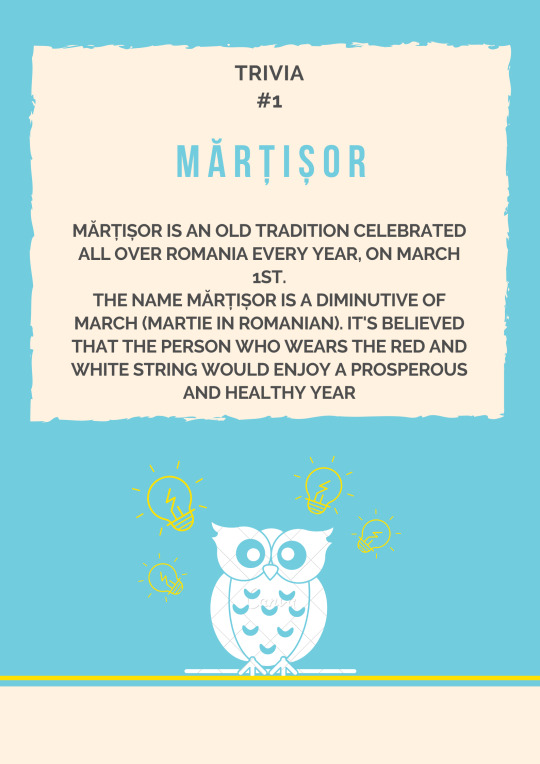
#languageblr#learn romanian#romanian#romanian langblr#romanian language#limba romana#romanian learning#studyblr#romanianblogger#romanian history#romanian tumblr#trivia#limbâ română#trivias about romania#fun facts
66 notes
·
View notes
Text
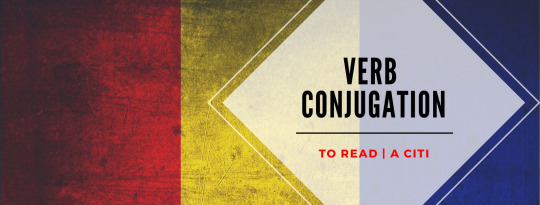
PRESENT
Eu citesc - I read
Tu citești - you read
El/ea citește - he/she read
Noi citim - we read
Voi citiți - you read
Ei/ele citesc - they read
PAST
Eu am citit - I read
Tu ai citit - you read
El/ea a citit - he/she read
Noi am citit - we read
Voi ați citit - you read
Ei/ele au citit - they read
FUTURE
Eu voi citi - I will read
Tu vei citi - you will read
El/ea va citi - he/she will read
Noi vom citi - we will read
Voi veți citi - you will read
Ei/ele vor citi - they will read
#languageblr#learn romanian#limba romana#romanian#romanian langblr#romanian language#romanian learning#studyblr#romanian grammar#grammar#limbâ română
39 notes
·
View notes
Text

PRESENT:
Eu sunt - I am
Tu ești - you are
El este - he is
Ea este - she is
Noi suntem - we are
Voi sunteți - you are
Ei/ele sunt - they are
PAST:
Eu am fost - I was
Tu ai fost - you were
El a fost - he was
Ea a fost - she was
Noi am fost - we were
Voi ați fost - you were
Ei/ele au fost - they were
FUTURE:
Eu voi fi - I will be
Tu vei fi - you will be
El va fi - he will be
Ea va fi - she will be
Noi vom fi - we will be
Voi veți fi - you will be
Ei/ele vor fi - they will be
#languageblr#learn romanian#limba romana#romanian#romanian langblr#romanian language#romanian learning#studyblr#limbâ română#romanian grammar#grammar#verbs
54 notes
·
View notes
Text
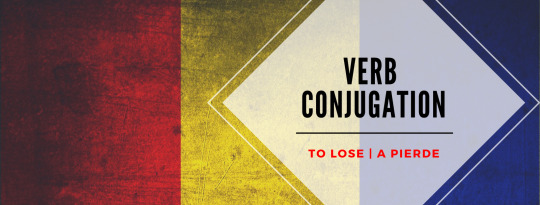
PRESENT
Eu pierd - I lose
Tu pierzi - you lose
El/ea pierde - he/she loses
Noi pierdem - we lose
Voi pierdeți - you lose
Ei/ele pierd - they lose
PAST
Eu am pierdut - I lost
Tu ai pierdut - you lost
El/ea a pierdut - he/she lost
Noi am pierdut - we lost
Voi ați pierdut - you lost
Ei/ele au pierdut - they lost
FUTURE
Eu voi pierde - I will lose
Tu vei pierde - you will lose
El/ea va pierde - he/she will lose
Noi vom pierde - we will lose
Voi veți pierde - you will lose
Ei/ele vor pierde - they will lose
#languageblr#learn romanian#limba romana#romanian#romanian langblr#romanian language#romanian learning#studyblr#romanian grammar#grammar#limbâ română
31 notes
·
View notes
Text
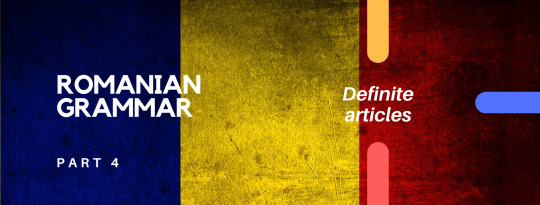
The definite article in Romanian has multiple forms, according to the gender, the number & the ending of the noun.
MASCULINE NOUNS
Example: un băiat (a boy)
Singular: băiatul (the boy)
Plural: băieții (the boys)
Example: un munte (a mountain)
Singular: muntele (the mountain)
Plural: munții (the mountains)
The definite articles for masculine nouns in the singular are:
-l
-ul
-le
-a
For masculine nouns in the plural, the invariable definite article is -i.
FEMININE NOUNS
Example: o fata (a girl)
Singular: fata (the girl)
Plural: fetele (the girls)
Example: o cană (a mug)
Singular: cana (the mug)
Plural: cănile (the mugs)
The definite article for feminine nouns in the singular are:
-a
-ua
For feminine nouns in the plural, the invariable definite article is -le.
NEUTER NOUNS
Example: un vin (a wine)
Singular: vinul (the wine)
Plural: vinurile (the wines)
Example: un ou (an egg)
Singular: oul (the egg)
Plural: ouăle (the eggs)
The definite articles for neuter nouns in the singular are:
-ul
-l
-le
For neuter nouns in the plural, the invariable definite article is -le.
USES OF DEFINITE ARTICLES
1. To accompany nouns that describe unique things:
Soarele răsare de la est - the sun rises in the East
2. To accompany nouns that are known to he speaker because of their proximity to the speaker:
Dă-mi cana - give me the mug
3. To accompany names of places, towns, people:
Președintele Trump a vizitat Spain - president Trump visited Spain
4. To accompany adjectives that are either placed before the nouns (inversion) or behave like nouns:
Frumosul Geralt a căzut de pe cal - the beautiful Geralt has fallen off his horse
5. To accompany other parts of speech that behave like nouns:
Împrejurul casei este o pajiște verde - around the house there's a green meadow
6. With days of the week, as adverbs when referring to habitual/repeated actions:
Lunea merg la dans - in Mondays I go to dance
7. When making a statement that expresses a generality:
Îmi plac mult munții - I love mountains
8. With the preposition cu, even if the noun is not qualified, when the noun denotes a means of transport or an instrument:
Peter Parker merge la universitate cu metroul - Peter Parker goes to university by underground
#languageblr#learn romanian#limba romana#romanian#romanian langblr#romanian language#romanian learning#studyblr#limbâ română#romanian grammar#grammar#romanian tumblr
35 notes
·
View notes
Text

Te iubesc - I love you
Însemni atat de mult pentru mine - you mean so much to me
Vrei să fii Valentinul meu? - will you be my Valentine?
Ești atât de frumoasă - you're so beautiful
Te consider mai mult decât un prieten - I think of you as more than a friend
O sută de inimi ar fi prea puține pentru a purta toată dragostea mea pentru tine - a hundred hearts would be too few to carry all my love for you
Ești atât de chipeș - you're so handsome
Am făcut o pasiune pentru tine - I've got a crush on you
Ești raza mea de soare, dragostea mea - you're my sunshine, my love
Cuvintele nu pot descrie dragostea mea pentru tine - words can't describe my love for you
Am fost sortiți să fim împreună - we were meant to be together
Dacă te-ai gândit la cineva în timp ai citit acest lucru, cu siguranță esti îndrăgostit - if you were thinking about someone while reading this, you're definitely in love
#romanian langblr#learn romanian#romanian language#romanian learning#romanian#romania#romanian phrases#limbâ română#limba romana#languageblr#studyblr#valentine's day#valentine's day phrases#how to say i love you in romanian#how to speak romanian
43 notes
·
View notes
Text
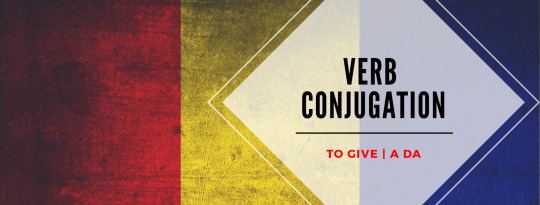
PRESENT
Eu dau - I give
Tu dai - you give
El dă - he gives
Ea dă - she gives
Noi dăm - we give
Voi dați - you give
Ei/ele dau - they give
PAST
Eu am dat - I gave
Tu ai dat - you gave
El a dat - he gave
Ea a dat - she gave
Noi am dat - we gave
Voi ați dat - you gave
Ei/ele au dat - they gave
FUTURE
Eu voi da - I will give
Tu vei da - you will give
El va da - he will give
Ea va da - she will give
Noi vom da - we will give
Voi veți da - you will give
Ei/ele vor da - they will give
#languageblr#learn romanian#limba romana#romanian#romanian langblr#romanian language#romanian learning#studyblr#verbs#romanian grammar#limbâ română
37 notes
·
View notes
Text
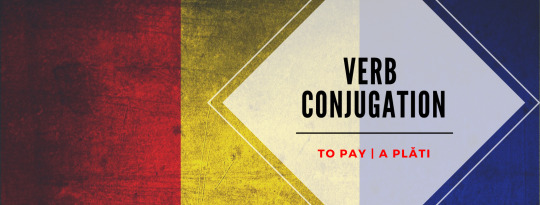
PRESENT
Eu plătesc - I pay
Tu plătești - you pay
El/ea plătește - he/she pays
Noi plătim - we pay
Voi plătiți - you pay
Ei/ele plătesc - they pay
PAST
Eu am plătit - I payed
Tu ai plătit - you payed
El/ea a plătit - he/she payed
Noi am plătit - we payed
Voi ați plătit - you payed
Ei/ele au plătit - they payed
FUTURE
Eu voi plăti - I will pay
Tu vei plăti - you will pay
El/ea va plăti - he/she will pay
Noi vom plăti - se will pay
Voi veți plăti - you will pay
Ei/ele vor plăti - they will pay
#languageblr#learn romanian#limba romana#romanian#romanian langblr#romanian language#romanian learning#studyblr#romanian grammar#grammar#limbâ română
28 notes
·
View notes
Text

Mă spăl pe dinți - I brush my teeth
Închid ușa - I close the door
Eu încui ușa - I lock the door
Mă duc la serviciu - I go to work
Ascult muzică pe smartphone-ul meu - I listen to music on my smartphone
Îmi pornesc computerul - I turn on my computer
Îmi verific e-mail-ul - I check my e-mail
Îmi spăl hainele - I do laundry
Pregătesc prânzul - I make lunch
Cumpăr produse alimentare - I buy groceries
Fac o baie fierbinte - I take a hot bath
Îmi încărc bateria telefonului - I charge the battery on my phone
Mă culc pe la miezul nopții - I go to sleep around midnight
Mă trezesc la 7 dimineața - I wake up at 7 a.m.
Mă ridic din pat - I get out of bed
Mănânc micul dejun - I eat breakfast
#languageblr#learn romanian#limba romana#romanian#romanian langblr#romanian language#romanian learning#studyblr#romanian vocabulary#limbâ română#language tumblr#language#vocab
36 notes
·
View notes
Text

Da - yes
Nu - no
Mulțumesc - thank you
Mulțumesc mult - thanks a lot
Este foarte amabil din partea dumneavoastră - that's very kind of you
Vă rog - please
Nu înțeleg - I don't understand
Salut - hello
La revedere - goodbye
Cu plăcere - you're welcome
Îmi pare rău - I'm sorry
Noroc! - cheers!
Este o plăcere - it's a pleasure
#languageblr#learn romanian#limba romana#romanian langblr#romanian#romanian language#romanian learning#studyblr#romanian vocabulary#limbâ română
28 notes
·
View notes
Text
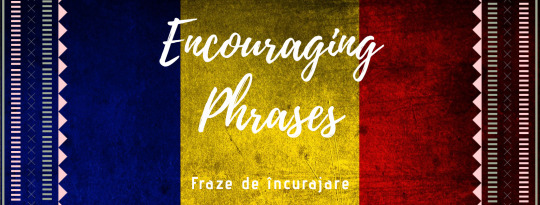
Poți să o faci! - You can do it!
Ce mai aștepți? - What are you waiting for?
Nu ești singur! - You're not alone!
Sunt foarte mândru de tine - I'm so proud of you
Nu renunța! - Don't give up!
Luptă în continuare! - Keep fighting!
Merită o încercare - it's worth a shot
Fă-o! - Go for it!
Ai încredere în tine - believe in yourself
Fii puternic - stay strong
Tu ești numărul unu - you're number one
Cerul este limita - the sky is the limit
#languageblr#learn romanian#limba romana#romanian#romanian langblr#romanian language#romanian learning#studyblr#romanian vocabulary#romanian phrases#limbâ română#language tumblr#language
36 notes
·
View notes
Text
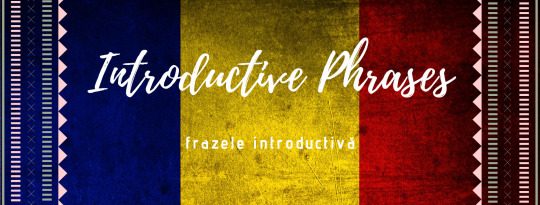
Bună, eu sunt ... - hi, I am ....
Bună ziua, mă bucur să te cunosc - good day, it's nice to meet you
Mă numesc ... - my name is ....
Locuiesc în București - I live in Bucharest
Am 27 de ani - I'm 27 years old
Îmi pare bine de cunoștință - nice to meet you
De unde ești? - where are you from?
Cum te numești? - what's your name?
Sunt din România - I'm from Romania
#languageblr#learn romanian#limba romana#romanian#romanian langblr#romanian language#romanian learning#studyblr#romanian vocabulary#limbâ română#phrases#useful phrases
20 notes
·
View notes
Text

pasăre (fem) - bird
pisică (fem) - cat
câine (masc) - dog
şoarece (masc) - mouse
curcan (neut) - turkey
vacă (fem) - cow
porc (masc) - pig
cal (masc) - horse
oaie (fem) - sheep
capră (fem) - goat
şarpe (masc) - snake
lup (masc) - wolf
maimuţă (fem) - monkey
leu (masc) - lion
girafă (fem) - giraffe
elefant (masc) - elephant
rac (masc) - crab
pui (masc) - chicken
homar (masc) - lobster
peşte (masc) - fish
miel (masc) - lamb
găină (fem) - hen
fluture (masc) - butterfly
urs (masc) - bear
rechin (masc) - shark
păianjen (masc) - spider
furnică (fem) - ant
broască (fem) - frog
pește (masc) - fish
albină (fem) - bee
tigru (masc) - tiger
#romanian langblr#romanian#romanian language#languageblr#limbâ română#limba romana#learn romanian#romanian learning#vocabulary#romanian vocabulary
36 notes
·
View notes
Text

Natură (fem) - nature
Vânt (neut) - wind
Iarnă (fem) - winter
Toamnă (fem) - autumn
Vară (fem) - summer
Primăvară (fem) - spring
Nor (masc) - cloud
Ploaie (fem) - rain
Zăpadă (fem) - snow
Soare (masc) - sun
Nisip (neut) - sand
Mare (fem) - sea
Munte (masc) - mountain
Pădure (fem) - forest
Floare (fem) - flower
Tunet (neut) - thunder
Cer (neut) - sky
Fulger (neut) - lightning
Deal (neut) - hill
#languageblr#learn romanian#limba romana#romanian#romanian langblr#romanian language#romanian learning#studyblr#romanian vocabulary#limbâ română
23 notes
·
View notes
Text

PRESENT
Eu chem - I call
Tu chemi - you call
El cheamă - he calls
Ea cheamă - she calls
Noi chemăm - we call
Voi chemați - you call
Ei/ele cheamă - they call
PAST
Eu am chemat - I called
Tu ai chemat - you called
El a chemat - he called
Ea a chemat - she called
Noi am chemat - we called
Voi ați chemat - you called
Ei/ele au chemat - they called
FUTURE
Eu voi chema - I will call
Tu vei chema - you will call
El va chema - he will call
Ea va chema - she will call
Noi vom chema - we will call
Voi veți chema - you will call
Ei/ele vor chema - they will call
#languageblr#learn romanian#limba romana#romanian#romanian langblr#romanian language#romanian learning#studyblr#romanian grammar#grammar#limbâ română
25 notes
·
View notes